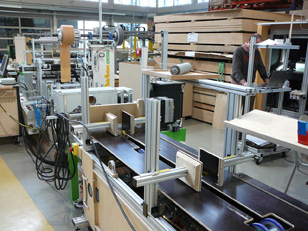 |
|
|
|
|
|
|
||||
|
(Based on a presentation of Dr. Ernst Kürsten at the 1st International Symposium "Wood sience - education and research programmes 2004" Stará Lesná, Slovakia 16.-20.08.2004)
At the end of the 18th century in Germany academic education of foresters started at several places. Lessons on wood use became part of the curriculum early. In his famous textbook for foresters (Lehrbuch für Förster und die es werden wollen.) Georg Ludwig Hartig in 1823 pointed out that foresters need to know very well what kind of lumber a carpenter needs for which part of a house´s construction. Otherwise the carpenter would always claim the best trees for each purpose. So by knowing the specific needs of their customers the foresters would be able to secure an optimal use of the wood ressources. |
||||||
2. Application-oriented bachelor programs
During the last few decades several similar“Universities of Applied Sciences” (Fachhochschulen) offering wood technology programs have been established in Hildesheim, Lippe and Eberswalde. They offer the following wood-related programs:
In addition similar programs of education have been run for a few years at three“Berufsakademien” (“Universities of Cooperative Education”) in Mosbach, Dresden and Melle. These academies offer three-year courses with several industrial placements in between which guarantee an education close to industry practice.
The first university curriculum focused on wood science and technology was developed and started at the former Forest University in Eberswalde near Berlin in 1939 bei H.H. Hilf. In 1946 the wood science school moved to Reinbek near Hamburg and then in 1960 to new buildings in Hamburg-Lohbrügge (together with the Johann Heinrich von Thünen-Institut (vTI: Federal Research Institute for Rural Areas, Forestry and Fisheries). More information on today´s curriculum of the University of Hamburg. Due to the budget reductions in the state´s forest services jobs for foresters became more and more scarce in Germany during the last decades. To open new job perspectives for its graduates the Faculty of Forest Sciences and Forest Ecology of the Universtity of Göttingen reformed its curriculum in 2000. The former title “Diplom-Forstwirt” was abolished and a new Bachelor- and Master-program was created (Details). Students who passed the Bachelor exam now can make their choice among five different Master-programs:
2. Nature Conservancy and Landscape Architecture 3. Wood Biology and Technology 4. Forest Ecosystem Analysis and Data Processing 5. Tropical and International Forestry (in English!) Some of the lectures (in English!) became part of the new Erasmus Mundus MSc program in Sustainable Forest and Nature Management SUFONAMA which can be focused on forest products. There are about 25 scholarships for students from outsides EU or EEA/EFTA countries available for this program: each of € 42,000 (€ 21,000 annually for two years). In 2008, application deadline for non-EU students is January 25th, for EU students August 15th. At the University of Dresden there is another program with a very long history, called “Wood and Fibrious Technology” . It is run by the Faculty of Mechanical Engineering and therefore more oriented towards technology. In addition, together with the Faculty of Forest, Geo and Hydro Sciences a Master-program and postgraduate studies in "Wood Technology and Timber Industry" is being offered, awarding the degree of„Master of Wood Science and Technology“ (MSc. Wood). The Bern University of Applied Sciences for Architecture, Wood and Civil Engineering in Biel (Switzerland) and the Rosenheim University of Applied Sciences (Germany) are offering a common Master of Engineering in Wood Technology course in English. See details: http://www.ahb.bfh.ch/ahb/en/Master/master_holztechnik.htm A very special possibility is the Ph.D.-program “Wood Biology and Technology” which was lauched in Göttingen in 2002.
|
|
|
|
|
